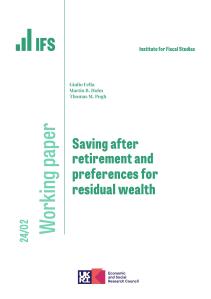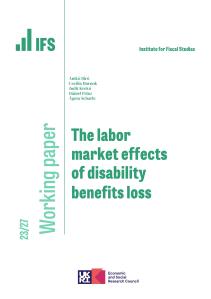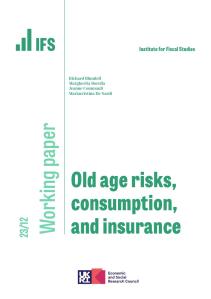In this paper we use the two waves of the British Retirement Survey (1988/1989 and 1994) to quantify the relationship between socioeconomic status and health outcomes. We find that, even after conditioning on the initial health status, wealth rankings are important determinants of mortality and the evolution of the health indicator in the survey. For men aged 65 moving from the 40th percentile to the 60th percentile in the wealth distribution increases the probability of survival by between 1.0 and 1.9 percentage points depending on the measure of wealth used. A similar effect is found for women of between 1.1 and 1.3 percentage points. In the process of estimating these effects we control for nonrandom attrition from our sample.
Authors

Carl Emmerson
Deputy Director
Carl, a Deputy Director, is an editor of the IFS Green Budget, is expert on the UK pension system and sits on the Social Security Advisory Committee.

Orazio Attanasio
Research Fellow
Orazio is an International Research Fellow at the IFS, a Professor at Yale and a Research Associate at the National Bureau of Economic Research.
Journal article details
- Publisher
- MIT Press
- ISSN
- 1542-4766
- Issue
- June 2003
Suggested citation
Attanasio, O and Emmerson, C. (2003). 'Mortality, health status and wealth' (2003)
More from IFS
Understand this issue

Retirement is not always a choice that workers can afford to make
comment
"More of us may feel little choice but to work a year or two longer than planned." Paul Johnson writes for The Times.
6 November 2023

The future of the state pension
podcast
We discuss the current challenges facing the state pension - and options for reform.
21 December 2023

Pensions are far from broken but could still use a fix
comment
Paul Johnson writes for The Times on the 'simple steps' get us to a 'stable, simple, affordable' pensions system.
18 December 2023
Policy analysis

The future of the state pension
report
This IFS Pensions Review report sets out key challenges for the UK’s state pension system and suggests a way forward for the future
13 December 2023

Recent trends in and the outlook for health-related benefits
report
Recipients of and spending on health-related benefits have risen rapidly since the start of the pandemic, posing a serious challenge for policymakers.
19 April 2024

4.2 million working-age people now claiming health-related benefits, could rise by 30% by the end of the decade
press release
Our new report sheds more light on forecasts for a substantial increase in the number of people claiming health-related benefits in coming years.
19 April 2024
Academic research

Saving after retirement and preferences for residual wealth
working paper
We use administrative data for Norway to estimate an incomplete-market life-cycle model of retired singles and couples.
18 January 2024

The labor market effects of disability benefit loss
working paper
Leveraging age and health cutoffs in the reassessment, the paper estimates employment responses to loss or reduction of benefits.
29 September 2023

Old age risks, consumption, and insurance
working paper
We measure the effects of income and health shocks on consumption among U.S. households over age 65.
21 March 2023